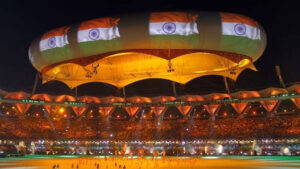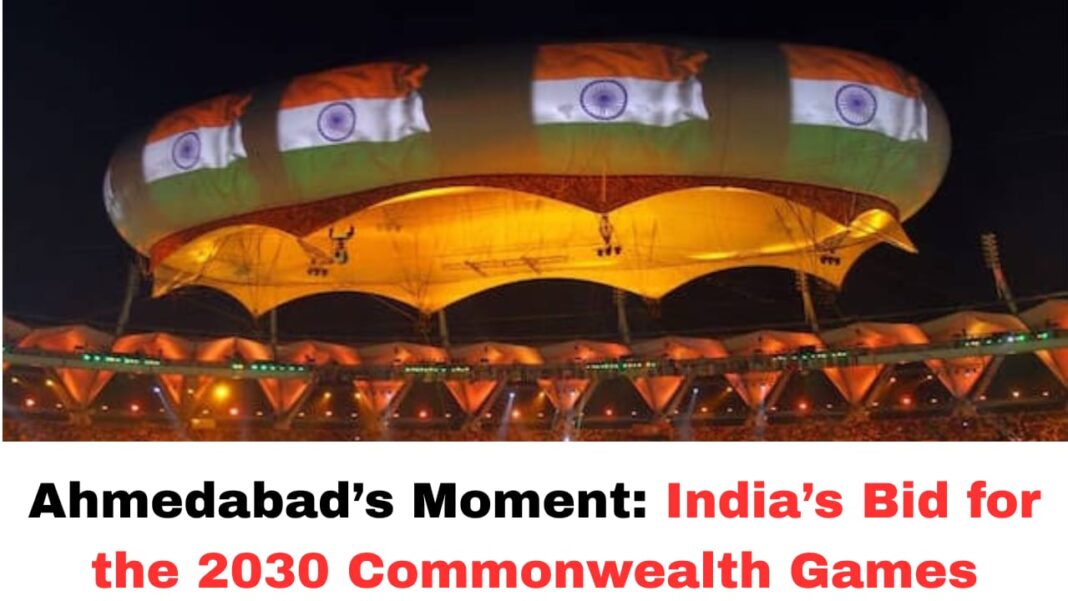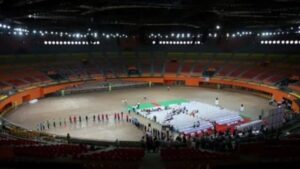Digital News Guru Sports Desk:
Ahmedabad, Gujarat is likely to host the 2030 Commonwealth Games
The Commonwealth Sport Executive Board officially recommended Ahmedabad, in Gujarat, as the proposed host city for the 2030 Centenary Commonwealth Games. The recommendation must still be ratified by the Commonwealth Sport General Assembly in Glasgow on November 26, 2025.
This development marks a major milestone for India, which last hosted the Games in New Delhi in 2010. If confirmed, the 2030 Games will also celebrate the 100-year anniversary of the first Commonwealth Games held in 1930 in Hamilton, Canada.

What Led to Ahmedabad’s Recommendation
Ahmedabad and Abuja, Nigeria were the candidates for the 2030 bid. After a detailed evaluation by the Commonwealth Sport Evaluation Committee — which looked at technical delivery, infrastructure, athlete experience, governance, alignment with the Commonwealth’s values, sustainability, and inclusivity — Ahmedabad emerged the preferred option.
India’s bid had strong backing from both the Union Government and the Gujarat state government. The Union Cabinet had earlier approved the bid and the required grant-in-aid for Gujarat, with clear assurances that support would be in place should the proposal go through.
Ahmedabad’s infrastructure credentials were key. Already, the city is aggressively investing in stadia, sports precincts, and related amenities in anticipation not just of the Commonwealth Games but of hosting the Olympics in 2036.
Infrastructure & Plans Towards 2036: Why Ahmedabad Is Positioning for More
While the 2030 Games are the near-term goal, Ahmedabad is also being positioned as the centerpiece of India’s bid for the 2036 Summer Olympics. The strategy has several pillars:
- Sardar Vallabhbhai Patel Sports Enclave (SPSE), Motera
A massive, 300-acre sports enclave is under planning in Motera, adjacent to the existing Narendra Modi Stadium. Cost estimates are around Rs 6,000 crore, and the plan includes multiple new stadiums, aquatic centres, courts for various sports, and supporting infrastructure. - New Sports Complexes & Hubs
Projects such as the Naranpura Sports Complex (20.39 acres, roughly Rs 632 crore) are underway. There are also plans for the Karai Sports Hub, upgraded arenas for hockey, indoor sports, and others. - Supporting Infrastructure
Apart from the stadiums and competition venues, preparations include improvements in airports (e.g., expansion of the SVPI airport), transport connectivity (metro, expressways), athlete villages, public amenities, and hotel capacity. - “Legacy First” approach
The master plans emphasize legacy — not building for the Games alone, but ensuring the city and state benefit in the longer run from infrastructure and sports promotion at grassroots.
What’s at Stake & Challenges Ahead
While the bid looks promising, success is not guaranteed, and there are hurdles:
- Final Approval: Ahmedabad still requires formal ratification by the Commonwealth Sport membership in Glasgow on November 26. Until then, the recommendation does not become official.
- Cost & Budgeting: Building and upgrading global-standard sports infrastructure is expensive. The estimated range for India’s 2036 Olympic bid (if it happens) runs into tens of thousands of crores. Ensuring cost overruns are minimized will be critical.
- Governance, Transparency, and Delivery Risk: International bodies will monitor governance of sports bodies, compliance with anti‐doping norms, and ability to deliver on schedule. Past concerns (e.g. Delhi 2010) may be referenced.
- Sustainability & Legacy: Ensuring facilities are well-used after the Games, avoiding “white elephants,” and integrating them into local sports and public life is essential. The transport, accommodation, and city planning around the Games must serve residents beyond the event.
- Competition & External Pressures: For 2036, other global cities or nations may also bid. India may also consider a multi-city approach or distributing some events across different regions to reduce burden.
Implications & Why This Matters
- For India, securing the 2030 CWG will be more than just hosting a sports event. It signals increasing maturity in planning, delivery, and infrastructure development. It will boost India’s profile in international sport.
- Economically, there is expected benefit in tourism, job creation, real estate development, and related industries such as hospitality and transport.
- Politically and socially, hosting large events helps galvanize local civic pride, strengthen urban infrastructure, improve connectivity, and promote mass sports participation. It can lead to improved sports culture, better access to training, facilities in previously underserved areas.
- The “games leverage” — using the opportunity of CWG to accelerate projects that would otherwise take longer — can bring forward infrastructure improvements with wider utility. Ahmedabad’s airport expansion, metro/rail connectivity, new sports hubs in city zones, etc., are examples.

Outlook
If the General Assembly in Glasgow confirms the recommendation, Ahmedabad will carry the responsibility of delivering an event befitting the Commonwealth’s centenary edition. The test will be execution: completing planned infrastructure in time, ensuring smooth logistics, embracing inclusivity, and delivering a memorable, efficient event.
Looking further ahead, the 2036 Olympics remain an ambitious goal. Given the scale required — cost, international scrutiny, sustainability — India will need to show it can deliver on smaller events first. The 2030 Commonwealth Games may well be that stepping stone: a chance to showcase capability, build trust, and demonstrate transparency and effectiveness.
Ahmedabad’s journey from bidding city to potential global sporting hub is well underway. The hope for many is that this is not just about hosting Games, but about transforming sport culture, infrastructure, and the urban landscape — leaving a legacy that endures long after the athletes have gone home.
You May Also Read: Hyderabad Mountaineer Bharath Thammineni Becomes First Indian to Scale All Accessible 8,000-Metre Peaks









